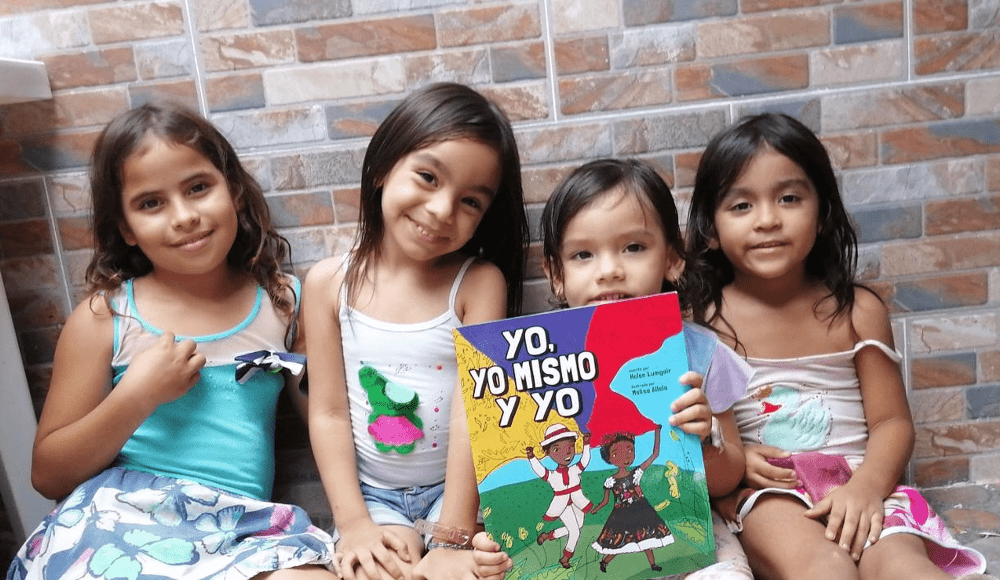Gender Equality in Education Benefits Every Child
“The only way to solve the problem of women’s subordination is to change people’s mindset and to plant the new idea of gender equality into every mind.”
–Qingrong Ma, China
According to the United Nations, gender equality is also known as equality of the sexes. It is the state of equal ease of access to resources and opportunities regardless of gender, including economic participation, decision making and the state of valuing different behaviours, aspirations and needs equally.
Educating Girls Is Their Birthright

Think Equal girls at Fundacion Escuela Nueva, Colombia.
The struggle for women’s and young girls’ rights has been a longstanding and ongoing issue due to a myriad of reasons and patriarchal dominance throughout history. The 1970s feminist movement made monumental strides and created much change and progress in bringing about greater gender parity due to the diligent work of strong, inspiring women such as Gloria Steinman, Simone de Beauvoir and Bell Hooks. In our present-day, much work has been carried on by equally strong women such as Michelle Obama, Malala Yousafzai, Chimamanda Ngozi Adichie and Margaret Attwood. Much of these women’s work is about educating girls and teaching them the significance of having and utilising their voices.
Unfortunately, today, poverty and social and cultural conditioning play a significant role in the lack of access to education. Archaic attitudes toward the role of women, discrimination and enforced stereotypes hinder further progress.
Gender-based discrimination in education is, in effect, both a cause and a consequence of deep-rooted societal differences. Due to these prevailing attitudes, young girls are denied the opportunity to start even in primary schools.
Every child should be entitled to a free quality primary education. However, in many developing nations, most governments lack the financial resources or political will to meet the children’s educational needs. Many girls are also not encouraged to get an education due to cultural and economic reasons. When a child fails to acquire primary education, both society and the child loses. Presently, statistics show that only fifty-five girls continue their education after high school for every hundred boys in low-income countries.
Education has been shown to improve the lives of young girls in many ways. They now have more participation in decision-making and more control over their lives, and they are healthier and have overall improved life expectancy.
Research has also shown that girls who receive an education are less likely to:
- marry young
- be a child bride
- contract HIV
- have fewer pregnancies
- experience less physical violence
Primary education improves not only the quality of the girl’s life but also the quality of her immediate family. It enhances the whole community and benefits future generations’ lives.
Gender discrimination is encoded in law in many countries throughout the world. Therefore, thousands of girls are denied their fundamental human right – education. What can we do about this? How do we change the current climate?
It is an enormous task, but we can take little steps like anything that seems impossible. I believe we must go back to basics and look at how an education from a very young age can change attitudes and perceptions. As this is a global issue, we must find new learning methods to understand the complexities and blocks that enforce this problem.
Are There Agents of Change Out There?

Think Equal ladybug-children at Fundacion Escuela Nueva, Colombia.
One of the organisations leading the way in creating change is Think Equal. It is an inspiring and innovative educational non-profit organisation set up six years ago by the formidable Leslee Udwin. She was inspired to set up Think Equal after hearing about the harrowing, vicious attack on a young 16-year-old girl and her friend on a bus in Delhi, India, in 2012. The attack and murder of the young girl created international outrage and put India’s human rights at the forefront of the world. Leslee travelled to Delhi to meet the perpetrators and was shocked to discover that the criminals thought they did nothing wrong and that their highly educated legal team believed the young girl deserved to be attacked and murdered.
Why is a girl seen as less valuable than a boy?
Why is this belief accepted in large parts of India, Southeast Asian countries and many countries worldwide?
She has brought up these critical questions in many of her interviews and talks. Leslee and her team of researchers, including neuroscientists, doctors, and experts in the field, developed a Social Emotional Learning programme that has been implemented in 18 nations around the world. The SEL programme is designed to teach 3-6-year-old children all aspects of value-based, social and emotional learning.
Think Equal’s primary mission and objective are to teach children that all humans are equal and should be equally valued. They want to eliminate discrimination, disrespect and violence from the next generation and bring empathy, well-being, kindness, respect and healthy relationships in their place. Their long-term goal is to achieve a global system change in education, introducing social and emotional learning as a compulsory new subject in every national curriculum worldwide.
I feel the Think Equal programme will be instrumental for the coming generations of young children worldwide. You can read more about their organisation and programs below:
Please follow them also on Instagram to keep up with their latest news.






